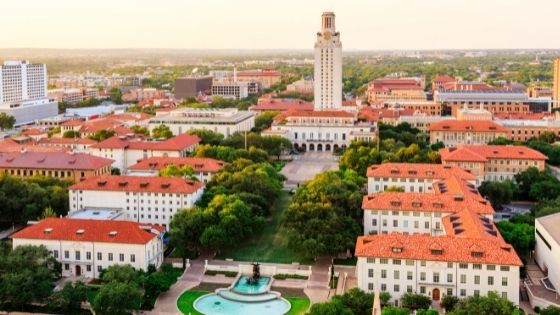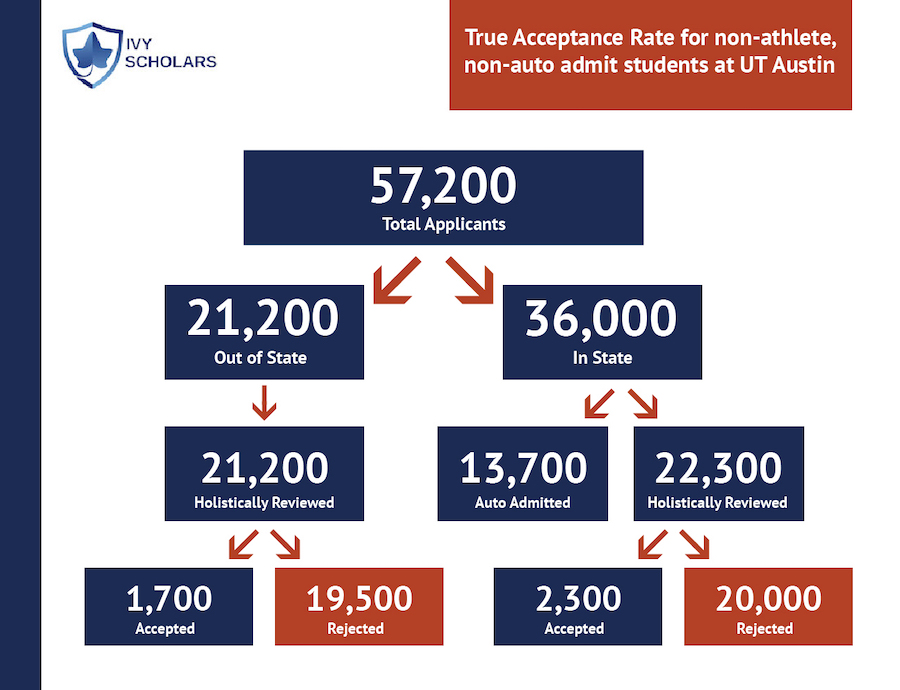UT Austin’s published acceptance rate is 31.8% for the 2020 admissions cycle, but this number does not tell the full story. Due to their admissions policy, UT Austin’s actual acceptance rate is much, much lower for many students.
In a process loved by some and dreaded by others, UT Austin automatically accepts students who are in the top 6% of their class in a Texas high school. This is a true automatic acceptance, although acceptance to your desired major is still based on the quality of the rest of your application. These automatic acceptances weigh heavily on the overall admissions rate. In effect, a large portion of the applicant pool has a 100% acceptance rate, which raises the overall acceptance rate for applicants.
For more information about how to get into UT Austin, check out our fact sheet here, or schedule a free consultation.
In this article, we’ll reveal UT Austin’s true acceptance rate for in-state students, unpack how we calculated that number, discuss the admissions rate for out of state students, and figure out your admissions chances at UT Austin. We hope that by knowing what your actual odds of success are, you can make well-informed decisions in choosing the colleges to which you’ll apply.
Holistic Admissions
Students who aren’t in the top 6% of their class, and therefore do not meet the bar for automatic admission, have their applications examined in a process called holistic admissions. This is the method all top universities in the US use to evaluate student applications and decide which students are best suited to attend their school. Approximately 4,500 students are admitted to UT Austin through the holistic process every year.
Holistic admissions looks at the student as a whole, weighing all parts of their application and background. In their review, UT Austin considers class rank, GPA, test scores, extracurriculars, natural talents, and essays. They do put some weight on race/ethnicity and whether they’re first-generation college students as well, as part of an effort to build a demographically diverse class each year.
A far cry from the 31.8% acceptance rate you might find through a casual Google search, UT Austin’s true acceptance rate for in-state students who are not automatically accepted is 10.3%
Here is how we calculated that number:
57,200 students applied to join the class of 2024.
36,000 were from Texas while 21,200 were from out-of-state. These students are sorted into two separate pools for admissions purposes, because 90% of students attending UT Austin must, by law, be in-state students.
Of the 36,000 in-state students, 13,700 are automatically admitted for being in the top 6% of their class. The remaining 22,300 are holistically reviewed. Of the 22,300 students who are holistically reviewed, 2,300 are accepted while 20,000 are rejected.
This makes UT Austin’s true in-state acceptance rate 10.3%.
All 21,200 out-of-state students are holistically reviewed. Of these students, 1,700 were admitted and 19,500 were denied. This makes UT Austin’s out-of-state true acceptance rate 8.0%.
Additionally, 500 recruited athletes are given special admissions consideration regardless of their state of residence. These athletes are typically accepted at a very high rate. For this reason, we have removed them from consideration.
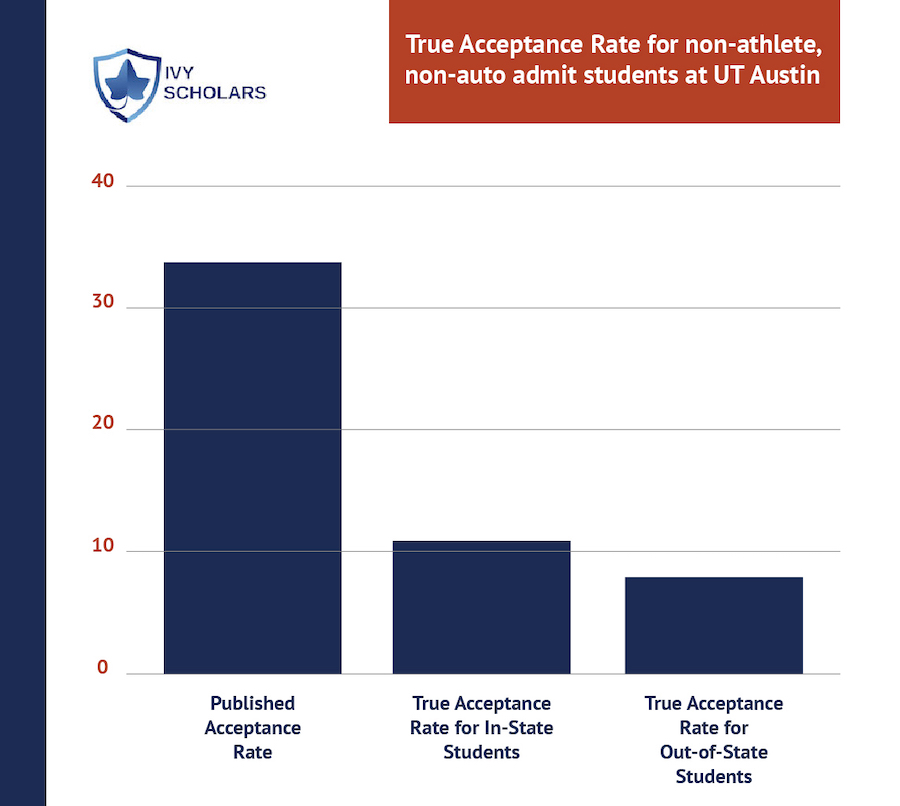
Combined, UT Austin’s true acceptance rate for non-athlete, non-automatically admitted students is 9.5%
In total, 18,290 students were admitted to UT Austin. Of these, 13,700 were automatically admitted, 2,300 were admitted from the in-state holistic review process, and 1,700 were admitted from the out-of-state holistic review process.
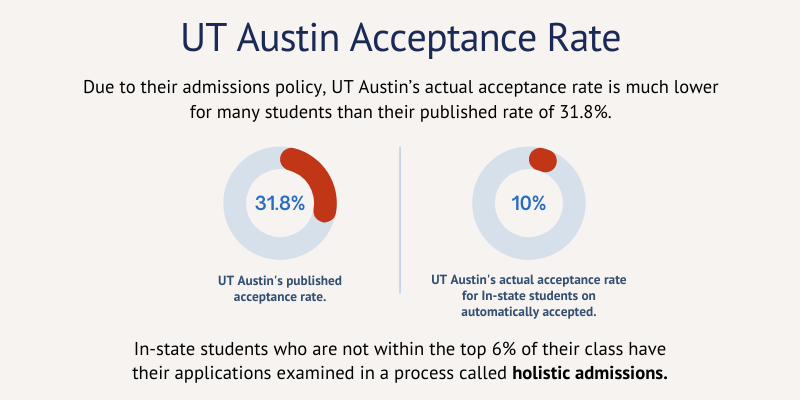
A note on recruited athetes:
In our calculations, we removed recruited athletes from the holistic admissions pool because recruited athletes see a significant boost to their admissions chances at UT Austin, even if their grades may not be as high as others in the application pool.
This is not to imply that every student athlete has sub-par grades; indeed, many are quite talented academically. They are, however, admitted at a much higher rate than non-recruited athletes, and thus should not be considered in the total numbers. This is especially true since UT Austin recruits so many athletes, in order to feed its strong athletics programs. If you are an athlete, read how that can impact your admissions chances.
This is the only outside factor which impacts admissions decisions in this way. UT Austin does not consider legacy status or potential donor relationships when making admissions decisions, though this was not always the case. After admissions controversy and resultant reforms in the 2010s, there is a greater degree of separation between the admissions office and the rest of campus.
In 2020, 4,500 students were admitted to UT Austin through the holistic admissions process while 13,700 were automatically admitted. 39,500 students were rejected.
All figures are approximate for the UT Austin class of 2024. Source: UT Austin admissions office
Holistic admissions examine the student as a whole: weighing all parts of their application and background, not just their grades and SAT/ACT score. Specifically, UT Austin considers class rank, GPA, test scores, extracurriculars, natural talents, and essays in their holistic review. Additionally, UT Austin does consider race, ethnicity, and whether applicants are first-generation college students as part of their effort to build a demographically diverse class.
So what is UT Austin’s acceptance rate for students who are not automatically admitted?
Out of State Admissions
By law, no more than 10% of students at UT Austin can come from outside Texas. This makes the admissions process for out of state students more competitive.
Students from outside Texas are kept in a separate admissions pool, meaning they are directly compared and only compete with one another. Overall, the grades and test scores of students from outside Texas are equivalent to those from within the state, but due to the limited number of spots the out of state students who are admitted are, on average, slightly more impressive than their peers from within Texas.
This dynamic is evinced by the makeup of the honors programs at UT Austin. As admission to these programs is not capped or constrained by residency, a disproportionate percentage of students in these programs are from outside of Texas.
A note on recruiting:
While UT Austin is striving to grow as an institution, their primary mission is still to serve the students of Texas. Thus, they do not recruit students from outside of Texas.
This means that if you are interested in UT Austin, you will need to seek out information on them yourself. Their representatives won’t be at college fairs near you if you don’t live in Texas, so you should consider visiting or otherwise reaching out if this is a school you are interested in attending.
What This Means For You
The most notable impact of this information should be a reevaluation of your chances of admission at UT Austin. Instead of the published ~30% odds, your chances are either 100% or 10%.
This may change where you place UT Austin on your college list, as it is a guaranteed safety for some students and a reach school for others. Of course, automatic admission still requires you to get your application in on time and for there to be enough seats left, so make sure you don’t miss important deadlines.
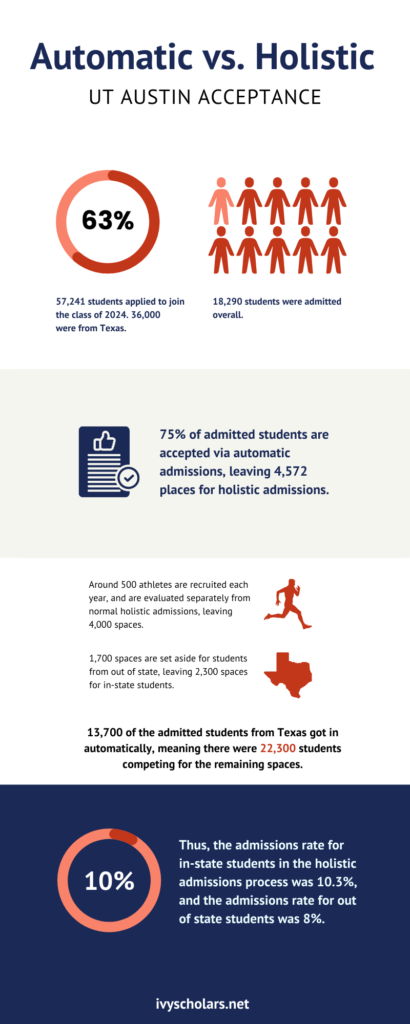
Increasing Your UT Admissions Odds
If you wish to increase your odds of acceptance at UT Austin, there are several strategies you can employ, depending on where you are in your academic career. If you are just starting high school, then working as hard as you can to be in the top percentile of your class by rank is the single best way to ensure acceptance to UT Austin. Since class rank is the only factor UT Austin looks at when deciding guaranteed admission, it is the only thing you need to worry about.
Of course, some high schools are more competitive than others, and most colleges care about more than just your class rank. If you want to be competitive at schools besides UT Austin, you should also develop your extracurricular activities, study for standardized tests, and work on growing as a person, all while maintaining a high GPA. It’s good that we don’t expect too much of high school students!
If you are an upperclassman, then your class rank may be more solidified. That does not mean it is immutable, merely that you have a better idea whether or not guaranteed admission is a reasonable route for you by your junior year.
If your class rank is not where you want it to be, you can of course try to excel in your coursework, and raise your rank before your senior year. You can also focus on working on the other parts of your academic and personal profile that colleges care about: what your passions are and how you explore them, your performance on standardized tests, and how you contribute to your community.
If you apply to UT Austin, and know you don’t meet the bar for automatic admission, then pay careful attention to your essays. UT Austin requires the personal statement, and three supplemental essays as well, and these are a major component of how you will be evaluated.
If all this seems a little overwhelming, you aren’t alone. Many students are daunted by the prospect of applying to college. Luckily, you don’t have to do it alone. Schedule a free consultation with us to discuss your concerns, and learn how we can help you make your college dreams come true.

